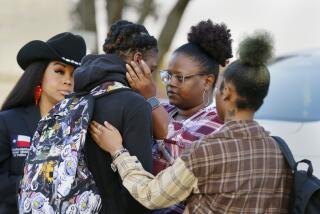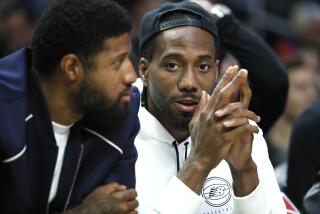Arabic-language flashcards don’t fly with TSA
Nicholas George planned to brush up on his Arabic vocabulary during a flight in August from Philadelphia to California, where he was to start his senior year at Pomona College. So he carried some Arabic-English flashcards in his pocket to study on the plane.
But those flashcards changed George’s life far beyond the classroom. The 22-year-old from Pennsylvania is speaking out against what he contends are abuses by federal authorities in airport security measures.
George, a physics major who is considering a career as a U.S. diplomat in the Middle East, is suing the Transportation Security Administration, the FBI and Philadelphia police for jailing him after his flashcards were found and confiscated in a Philadelphia airport screening. His lawsuit, filed in federal court this week, said his four hours in detention, half of that in handcuffs, violated his rights to free speech and protection against unreasonable search and seizure.
“I feel the TSA acts like it has a blank check as long as what it does is in the name of fighting terrorism,” George, said Thursday from Claremont, where he lives in a dormitory. “Of course, the TSA’s job is to keep us safe -- but they have to follow the Constitution and respect rights.”
If his flashcards triggered such deep suspicion, George said, “then we’ve got a real 1st Amendment issue here. I have a right to study Arabic.”
The student acknowledged that a few of the vocabulary words, including “bomb” and “terrorism,” may have alarmed authorities, but he also said he needed to learn them in order to understand the news of the day in Arabic-language newspapers.
George said his interest in Arab culture began when he saw “Lawrence of Arabia” as a child. “The more I studied it, the more I was fascinated it by it,” he said. He plans to take the State Department exam to become a foreign service officer.
Last year, George spent a semester in Jordan, where he studied Arabic, and then traveled to Egypt, Ethiopia and Sudan. He said his passport, with stamps from those countries, and a book in his possession that was critical of U.S. foreign policy, may also have raised suspicions at the airport.
Professors describe George as an excellent student in science and Arabic.
“He’s sharp and he’s really interested in the language, interested in the culture. He loves to pick up expressions and idioms,” said Bassam Frangieh, a professor of Arabic at Claremont McKenna College, where George takes classes through the Claremont Colleges consortium.
Spokespersons for the TSA and FBI declined to comment, saying they don’t discuss ongoing litigation.
The lawsuit, filed with the help of the American Civil Liberties Union, details George’s allegations of abusive questioning. The suit contends that an FBI agent cursed him and asked George if he was Muslim or a member of any “pro-Islamic” or communist student groups, to which he replied no. The student said he was later released without an apology. Having missed his original flight, he flew to California the next day.
Ben Wizner, the ACLU attorney who helped file the suit, said George “is the kind of young man that this country should be encouraging and creating more of. He has traveled the world with an open mind and an open heart, and he is studying the language that the State Department and the military have made clear we need more Americans to study.”
Although George’s suit seeks unspecified financial damages, he said he also hoped to help teach airport screeners to respect travelers’ civil rights.
“The point I want to make is that rules apply to the TSA,” he said. “Rules matter.”
More to Read
Sign up for Essential California
The most important California stories and recommendations in your inbox every morning.
You may occasionally receive promotional content from the Los Angeles Times.











